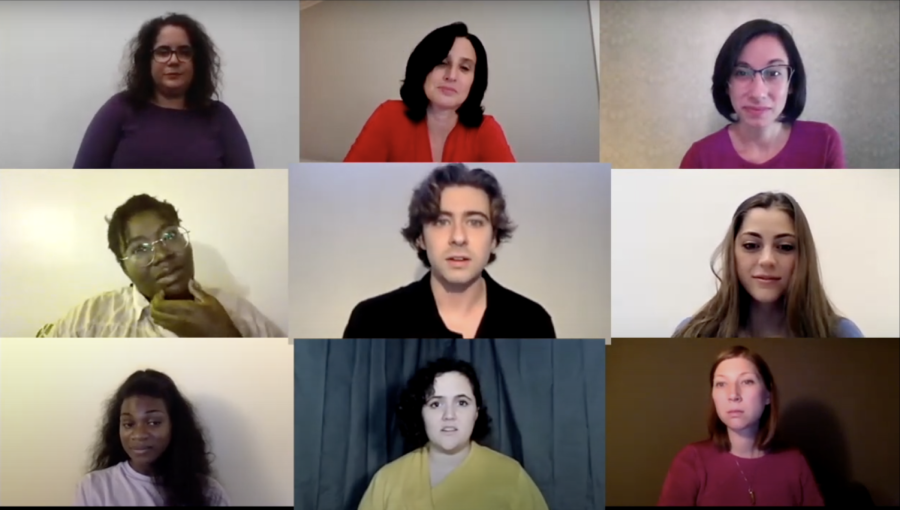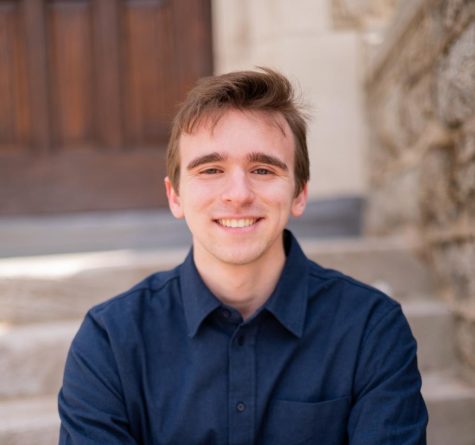Villanova Theatre Takes On Euphrides’ “Bakkhai”
The reading of “Bakkhai” by Anne Carson was broadcasted on Oct. 12 and Oct. 18.
November 25, 2020
The future looked grim for Villanova Theatre. COVID-19 sent the U.S. into lockdown in March, the same month that the long-awaited John and Joan Mullen Center for the Performing Arts was to have its grand opening. However, Villanova Theatre pulled together and released numerous online performances in the Fall 2020 semester.
Villanova Theatre’s focus this semester has been on the tragedy “Bakkhai,” from the ancient Greek playwright Euripides.
The Chair of the Department of Communication, Dr. Heidi Rose, directed a reading of poet Anne Carsons’ adaptation of “Bakkhai,” which took place over Zoom.
The reading, which ran for roughly an hour and a half, was made available through the Villanova Theatre website twice, on Oct. 12 and Oct. 18, with a recommended donation of $10 for viewers.
“They came up with the idea of doing a Zoom reading of this one particular translation, and they asked me if I would direct it,” Rose said. “So that’s how I got involved in it. I really wanted to make it a very inclusive experience.”
The cast was a combination of undergraduates, graduate students, and even retired professors (John Christie and Jim Immer).
In some cases, as with junior Ryan Henry, this was the first time students were intricately involved in a Villanova Theatre production.
Henry originally auditioned for an acting role in order to fulfill the extracurricular requirements of her Minor in Theatre. To her surprise, she was taken on the team not as a cast member, but as the Student Stage Manager.
Usually, such a job would entail tasks like taping floors. Given that Henry was managing performances over Zoom, her job would be quite different this time. Most of the job consisted of editing the entire production after the fact, through the use of iMovie. Henry added bells and drums to the Zoom recording. Occasionally, she had to rearrange the placement of the actors on the screen. For example, one scene in the play involves a chorus. Henry had to rearrange each of the boxes of the Zoom call, so that the chorus surrounds the center box.
The duties of Stage Manager also required major attention to detail.
“I am not an organized person at all, but this forced me to be organized,” Henry said. “I had to take note of every single detail from rehearsal reports.”
Both Rose and Henry affirmed that the production experience was much more difficult online than it would have been normally. They spent Saturdays and Sundays together from noon to 9:00 p.m., working out the kinks of the production in Rose’s office. In the end, the reading was a success.
In addition to the reading of Anne Carson’s “Bakkhai,” Villanova Theatre also ran the “Bakkhai Variations.”
Back in May, Villanova Theatre commissioned five MA in Theatre alumni to write short plays in response to Anne Carson’s adaptation of Euripides’ “Bakkhai.” These alumni are Jessica Bedford ’10, Mark Costello ’10, Alexandra Espinoza ’18, Alix Rosenfeld ’16mand Megan Schumacher ’18. Bedford wrote the variation entitled “Beginning,” Costello wrote the variation “She Makes Knives Now,” Espinoza wrote the variation “exxx… stasis, exxx… hale,” Rosenfeld wrote the variation “The Bakkhai; or, I’m trying so hard to be good,” and Schumacher wrote the variation “Dionté and Khai Do Dinner.”
These plays were presented individually throughout the month of October and then as a unified work on Halloween. The unified work, entitled “Bakkhai Variations,” was presided over by University professor and award-winning filmmaker Hezekiah Lewis. The readings of the five original plays were pre-recorded, with some plays being shot over Zoom as simple readings, and some plays being shot in a more cinematic fashion. Viewers were encouraged to donate $5 for each of the short plays and $25 for the full-length film “Bakkhai Variations.”
Fans of Villanova Theatre look forward to the spring, when the Topper Theatre in the John and Joan Mullen Center for the Performing Arts might finally be adequately put to use.













